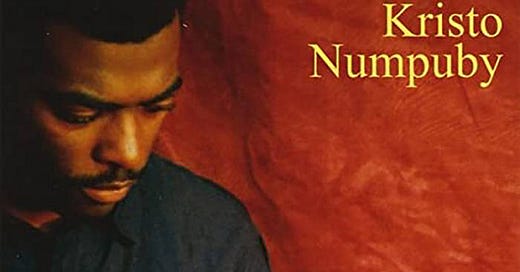EVERY GENRE PROJECT - January 31 - Assiko
Genre of the Day - Assiko
Album of the Day - Assiko City by Kristo Numpuby (1997)
Today, I almost made the same mistake as the now personally infamous tamborito incident of four days ago, and just barely swerved away from listening to an album that was not assiko at all. I blame Rate Your Music for this; with niche genres, nobody is really fact checking if genre classification is correct, and thus inconsistencies are inevitable. But today, I am wiser than the guy I was earlier this week. Often times, I forget that I simply learned French for ten years in school, because I’m just not exposed to French on a regular basis. But I quickly noticed on the first song of the album that is listed #1 for assiko that they kept mentioning Senegal and praising it in French—seemed a bit out of the ordinary for a genre that originated in Cameroon. I’m proud to say my rudimentary, rusty knowledge of French helped me pivot to an album that actually fits the genre.
Assiko in this context takes its name from the traditional dance of the Bassa people in southern Cameroon. There’s a dearth of information that I could find easily (throughout this project, I’m learning that individual music blogs from over ten years ago are where all the information about more niche genres, but they’re hard to come by), but it seems like the genre is inspired in name from the dance because of its traditional significance in Bassa culture. However, I’m sort of inferring here: this article says that assiko has been applied to recordings and traditions in multiple places around West Africa, elucidating the mystifying presence album of the Senegalese album for assiko that’s #1 on RYM—it uses a Senegalese percussion style called assiko. This certainly makes a good argument for more music researchers to take linguistics classes. The music, in a faster pace than what I found on today’s album, is indeed combined with the dance. In this video, you get a chance to experience the two intertwined. The assiko dance demands physical intensity and an emphasis on the hip movements of the dancers. This video also contains the most physically impressive, beyond Olympics-level splits I’ve ever seen—god bless dancers’ joints.
Tangent aside, assiko has become a popular genre in southern Cameroon, with individual guitarists being the stars of the show. Additionally, what makes assiko stand apart is the marriage of the guitar with glass bottle percussion in the traditional style of Bassa rhythms. The guitar spread among Cameroonian musicians after being introduced by Portuguese sailors, and are now a staple of musical culture.
This is reflected by today’s album, Assiko City (stylized inexplicably on the album cover in Greek letters) by guitarist Kristo Numpuby. This album is a diverse take on the genre, with barer, guitar-only tracks appearing throughout, as well as more jaunty and traditional songs with all of assiko’s elements including the glass bottle percussion and backing vocalists, such as Mè Kè Mè Jè! As much as he mixes and matches more minimal or more traditionally rich styles depending on the track, he also seamlessly alternates between the Bassa and French languages. A musical curator, having been raised on a diverse range of American and African musical styles growing up, Numpuby offers a deft example of how to represent a traditional style while infusing it with one’s own musical experimentation. He’s like the Stevie Wonder (who inspired Numpuby to begin recording music after meeting him at a hotel while touring and realizing even though he’d been playing, he hadn’t recorded anything to show when Wonder requested) or the Björk of assiko. Today’s album journey is an excellent, diverse listen, just as much as my research path was also a reminder of how I’ll never be able to do the splits.




